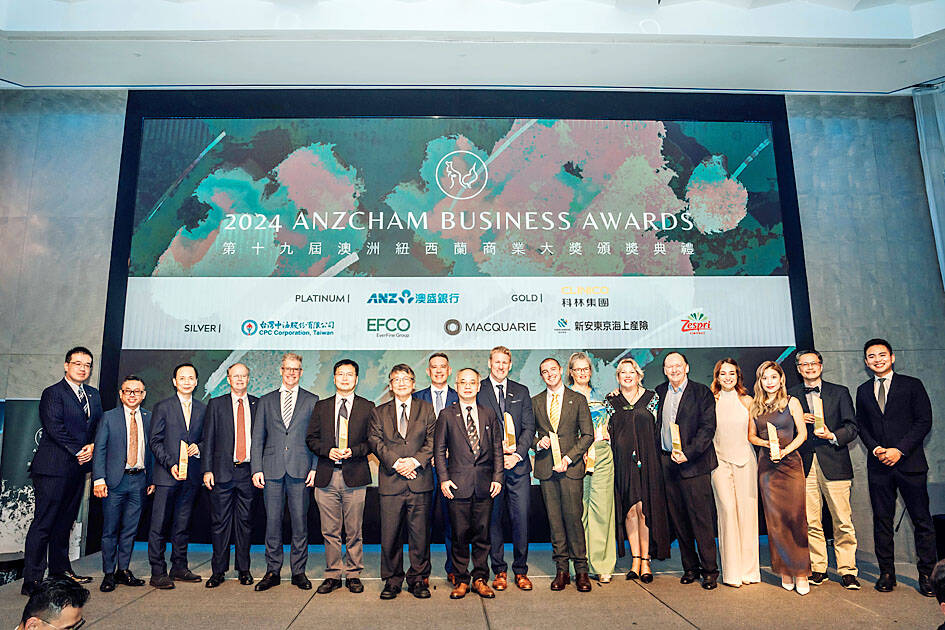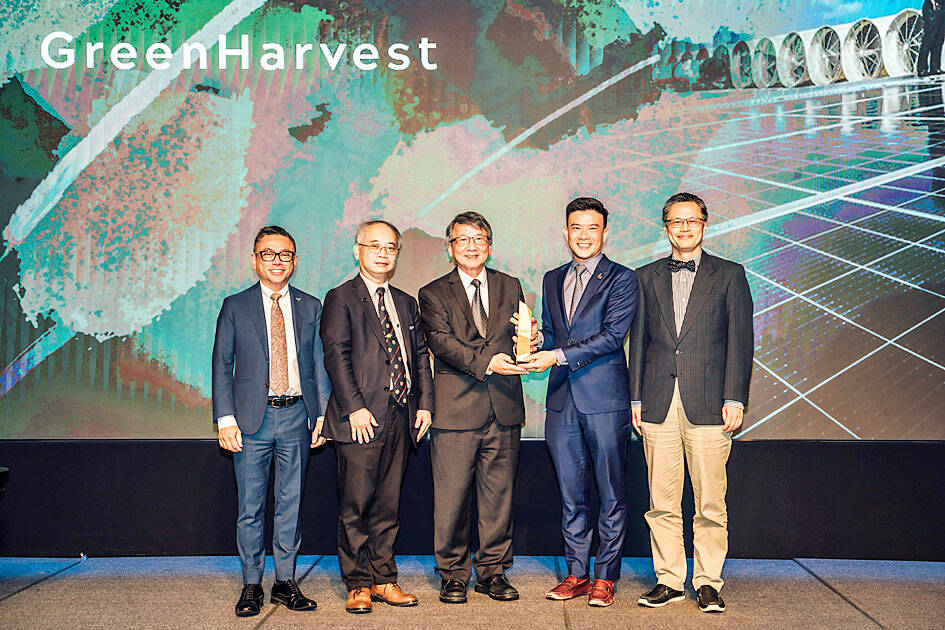On September 10, 2024, GreenHarvest was honored with the Australia-Taiwan Partnership Award at the 19th Annual ANZCham Business Awards, held at the Shangri-La’s Far Eastern Plaza Hotel in Taipei. This prestigious recognition not only highlights GreenHarvest’s steadfast commitment to fostering business ties between Australia and Taiwan, but also acknowledges the company’s significant contributions to the sustainable energy sector.
Since its inception, GreenHarvest has been at the forefront of promoting renewable energy development. Driven by its core values of innovation, collaboration, and sustainability, the company aims to establish itself as a one-stop service provider for RE100 solutions, empowering the Taiwanese government and local businesses to achieve their green transition goals and play a pivotal role in the global energy transformation. With an impressive portfolio of over 300 MW of installed solar capacity, GreenHarvest is on track to introduce more than 200 million kWh of green energy into the market annually.

Photo provided by GreenHarvest
THE ORIGINS OF THE GREEN HYDROGEN PROJECT
Since 2020, GreenHarvest has actively engaged in renewable energy trading, supplying renewable electricity to over 130 locations. Last year, the company partnered with the governments of Tainan City and Chiayi County to launch a renewable energy supply platform aimed at enhancing local businesses’ access to renewable electricity. Through in-depth research, GreenHarvest has identified green hydrogen as a crucial component in achieving 100% renewable electricity penetration in the future.
AUSTRALIA’S GREEN HYDROGEN ADVANTAGE

Photo provided by GreenHarvest
In its pursuit of green hydrogen solutions, GreenHarvest participated in the Taiwan-Australia Joint Energy and Minerals, Trade and Investment Cooperation Consultations, uncovering Australia’s substantial advantages in green hydrogen production. With a land area 130 times that of Taiwan, Australia boasts vast expanses of affordable land and abundant sunlight, resulting in some of the lowest solar power generation costs globally. The cost of renewable electricity in Australia is less than NT$1 per kilowatt-hour, approximately one-fifth of Taiwan’s renewable electricity purchase price. Recent government initiatives, including renewable energy and green hydrogen subsidy programs, have further solidified GreenHarvest’s confidence in investing in Australia’s green hydrogen sector.
INTERNATIONAL COLLABORATION
GreenHarvest prioritizes Australia as a strategic partner. With active support from both the Taiwanese and Australian governments, and after multiple evaluations over a period of a year and a half, GreenHarvest signed an exclusive cooperation agreement in May with Australia’s H2U for a large-scale green hydrogen project. This collaboration will leverage Taiwan’s semiconductor expertise in water resource management and encourage Taiwanese companies to engage in hydrogen production through water electrolysis. Additionally, GreenHarvest plans to offer renewable energy forecasting and power dispatch technologies to optimize the green hydrogen production process, further enhancing the strategic partnership in sustainable energy between Taiwan and Australia.
LOOKING AHEAD: A COMMITMENT TO SUSTAINABLE ENERGY
This award not only highlights GreenHarvest’s achievements in the green hydrogen sector but also underscores the importance of international collaboration in addressing global energy challenges. GreenHarvest looks forward to continuing its mission of promoting sustainable energy solutions while further strengthening the cooperative relationship between Taiwan and Australia.
Chairman KH Chen stated, “This award is a testament to our team’s relentless dedication and innovation. We remain committed to advancing hydrogen energy technology and contributing to the global energy transition.”

MULTIFACETED: A task force has analyzed possible scenarios and created responses to assist domestic industries in dealing with US tariffs, the economics minister said The Executive Yuan is tomorrow to announce countermeasures to US President Donald Trump’s planned reciprocal tariffs, although the details of the plan would not be made public until Monday next week, Minister of Economic Affairs J.W. Kuo (郭智輝) said yesterday. The Cabinet established an economic and trade task force in November last year to deal with US trade and tariff related issues, Kuo told reporters outside the legislature in Taipei. The task force has been analyzing and evaluating all kinds of scenarios to identify suitable responses and determine how best to assist domestic industries in managing the effects of Trump’s tariffs, he

TIGHT-LIPPED: UMC said it had no merger plans at the moment, after Nikkei Asia reported that the firm and GlobalFoundries were considering restarting merger talks United Microelectronics Corp (UMC, 聯電), the world’s No. 4 contract chipmaker, yesterday launched a new US$5 billion 12-inch chip factory in Singapore as part of its latest effort to diversify its manufacturing footprint amid growing geopolitical risks. The new factory, adjacent to UMC’s existing Singapore fab in the Pasir Res Wafer Fab Park, is scheduled to enter volume production next year, utilizing mature 22-nanometer and 28-nanometer process technologies, UMC said in a statement. The company plans to invest US$5 billion during the first phase of the new fab, which would have an installed capacity of 30,000 12-inch wafers per month, it said. The

Taiwan’s official purchasing managers’ index (PMI) last month rose 0.2 percentage points to 54.2, in a second consecutive month of expansion, thanks to front-loading demand intended to avoid potential US tariff hikes, the Chung-Hua Institution for Economic Research (CIER, 中華經濟研究院) said yesterday. While short-term demand appeared robust, uncertainties rose due to US President Donald Trump’s unpredictable trade policy, CIER president Lien Hsien-ming (連賢明) told a news conference in Taipei. Taiwan’s economy this year would be characterized by high-level fluctuations and the volatility would be wilder than most expect, Lien said Demand for electronics, particularly semiconductors, continues to benefit from US technology giants’ effort

‘SWASTICAR’: Tesla CEO Elon Musk’s close association with Donald Trump has prompted opponents to brand him a ‘Nazi’ and resulted in a dramatic drop in sales Demonstrators descended on Tesla Inc dealerships across the US, and in Europe and Canada on Saturday to protest company chief Elon Musk, who has amassed extraordinary power as a top adviser to US President Donald Trump. Waving signs with messages such as “Musk is stealing our money” and “Reclaim our country,” the protests largely took place peacefully following fiery episodes of vandalism on Tesla vehicles, dealerships and other facilities in recent weeks that US officials have denounced as terrorism. Hundreds rallied on Saturday outside the Tesla dealership in Manhattan. Some blasted Musk, the world’s richest man, while others demanded the shuttering of his